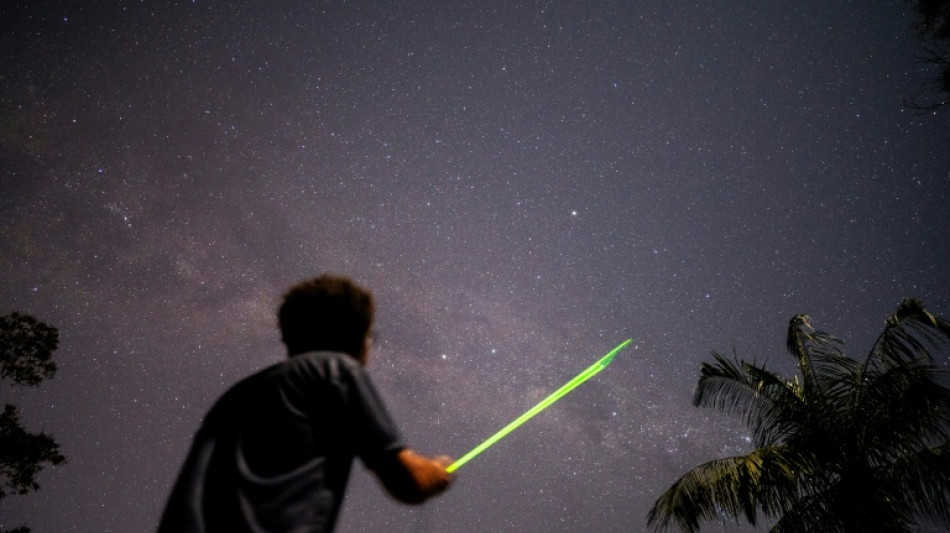
-
 Barca strengthen Liga lead at Villarreal, Atletico go third
Barca strengthen Liga lead at Villarreal, Atletico go third
-
Third 'Avatar' film soars to top in N. American box office debut

-
 Third day of Ukraine settlement talks to begin in Miami
Third day of Ukraine settlement talks to begin in Miami
-
Barcelona's Raphinha, Yamal strike in Villarreal win

-
 Macron, on UAE visit, announces new French aircraft carrier
Macron, on UAE visit, announces new French aircraft carrier
-
Barca's Raphinha, Yamal strike in Villarreal win

-
 Gunmen kill 9, wound 10 in South Africa bar attack
Gunmen kill 9, wound 10 in South Africa bar attack
-
Allegations of new cover-up over Epstein files

-
 Atletico go third with comfortable win at Girona
Atletico go third with comfortable win at Girona
-
Schwarz breaks World Cup duck with Alta Badia giant slalom victory

-
 Salah unaffected by Liverpool turmoil ahead of AFCON opener - Egypt coach
Salah unaffected by Liverpool turmoil ahead of AFCON opener - Egypt coach
-
Goggia eases her pain with World Cup super-G win as Vonn takes third

-
 Goggia wins World Cup super-G as Vonn takes third
Goggia wins World Cup super-G as Vonn takes third
-
Cambodia says Thai border clashes displace over half a million

-
 Kremlin denies three-way US-Ukraine-Russia talks in preparation
Kremlin denies three-way US-Ukraine-Russia talks in preparation
-
Williamson says 'series by series' call on New Zealand Test future

-
 Taiwan police rule out 'terrorism' in metro stabbing
Taiwan police rule out 'terrorism' in metro stabbing
-
Australia falls silent, lights candles for Bondi Beach shooting victims

-
 DR Congo's amputees bear scars of years of conflict
DR Congo's amputees bear scars of years of conflict
-
Venison butts beef off menus at UK venues

-
 Cummins, Lyon doubts for Melbourne after 'hugely satsfying' Ashes
Cummins, Lyon doubts for Melbourne after 'hugely satsfying' Ashes
-
'It sucks': Stokes vows England will bounce back after losing Ashes

-
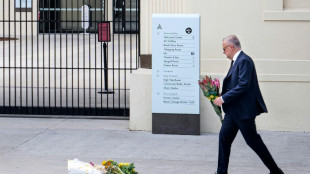 Australia probes security services after Bondi Beach attack
Australia probes security services after Bondi Beach attack
-
West Indies need 462 to win after Conway's historic century

-
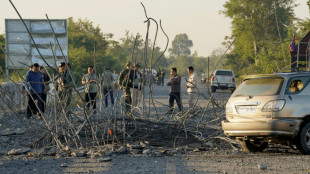 Thai border clashes displace over half a million in Cambodia
Thai border clashes displace over half a million in Cambodia
-
Australia beat England by 82 runs to win third Test and retain Ashes

-
 China's rare earths El Dorado gives strategic edge
China's rare earths El Dorado gives strategic edge
-
Japan footballer 'King Kazu' to play on at the age of 58

-
 New Zealand's Conway joins elite club with century, double ton in same Test
New Zealand's Conway joins elite club with century, double ton in same Test
-
Australian PM orders police, intelligence review after Bondi attack
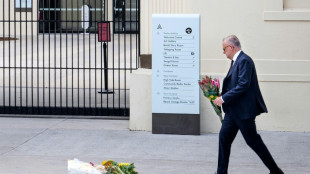
-
 Durant shines as Rockets avenge Nuggets loss
Durant shines as Rockets avenge Nuggets loss
-
Pressure on Morocco to deliver as Africa Cup of Nations kicks off

-
 Australia remove Smith as England still need 126 to keep Ashes alive
Australia remove Smith as England still need 126 to keep Ashes alive
-
Myanmar mystics divine future after ill-augured election

-
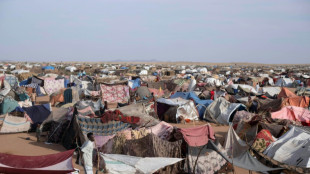 From the Andes to Darfur: Colombians lured to Sudan's killing fields
From the Andes to Darfur: Colombians lured to Sudan's killing fields
-
Eagles win division as Commanders clash descends into brawl

-
 US again seizes oil tanker off coast of Venezuela
US again seizes oil tanker off coast of Venezuela
-
New Zealand 35-0, lead by 190, after racing through West Indies tail

-
 How Can Gum Disease Lead to Tooth Loss in Kyle, TX?
How Can Gum Disease Lead to Tooth Loss in Kyle, TX?
-
West Indies 420 all out to trail New Zealand by 155

-
 Arteta tells leaders Arsenal to 'learn' while winning
Arteta tells leaders Arsenal to 'learn' while winning
-
Honour to match idol Ronaldo's Real Madrid calendar year goal record: Mbappe

-
 Dupont helps Toulouse bounce back in Top 14 after turbulent week
Dupont helps Toulouse bounce back in Top 14 after turbulent week
-
Mbappe matches Ronaldo record as Real Madrid beat Sevilla

-
 Gyokeres ends drought to gift Arsenal top spot for Christmas
Gyokeres ends drought to gift Arsenal top spot for Christmas
-
Arsenal stay top despite Man City win, Liverpool beat nine-man Spurs

-
 US intercepts oil tanker off coast of Venezuela
US intercepts oil tanker off coast of Venezuela
-
PSG cruise past fifth-tier Fontenay in French Cup

-
 Isak injury leaves Slot counting cost of Liverpool win at Spurs
Isak injury leaves Slot counting cost of Liverpool win at Spurs
-
Juve beat Roma to close in on Serie A leaders Inter


In Brazil, stargazers escape cities in search of 'astro-tourism'
Awestruck by the oranges and blues of the Jewel Box star cluster, part of the Southern Cross constellation, Pedro Froes manages to get out a few words: "It's incredible."
Froes is viewing the stars from a telescope in Desengano State Park, a rural patch of Brazil largely spared from light pollution, located some 260 kilometers (160 miles) north of Rio de Janeiro.
Desengano is Latin America's first "International Dark Sky Park," as designated by the global light pollution tracker DarkSky. And Froes is one of the park's growing number of "astro-tourists," drawn there by its isolation from cities and the light they spew into the night sky.
"From here you can see 3,000 stars a year with the naked eye, without the help of an instrument," says astronomer Daniel Mello, from the Valongo Observatory at the Federal University of Rio de Janeiro.
"In cities like Rio or Sao Paulo, at most, you can see 200 a year."
In the front garden of the park's headquarters, located in the small town of Santa Maria Madalena, Mello conducts a public observation session in front of about 20 people, pointing with a laser to the Southern Cross, Scorpio and Centaurus constellations.
The evening is part of a project created by Mello and a group of specialists in tourism, ecology and photography.
The nearest big city is 120 kilometers away, protecting the park -- replete with vegetation, forest and mountains -- from artificial light.
That means the Milky Way is visible to the naked eye even on moonlit nights. Two telescopes provide views of more distant stars.
"I always liked to admire the sky, but I rarely had the opportunity to see it like here," says Froes, a 22-year-old biologist from Niteroi, a city near Rio.
- Annual star festival -
Some 80 percent of people on Earth sleep under night skies polluted by artificial light, the consequence of modernization and urbanization.
But beyond clouding out the stars, light pollution also has negative environmental effects -- leading to restless humans and disoriented migratory birds, and causing reproductive issues for other species.
In Latin America, the only other area recognized by DarkSky is in Chile's Elqui Valley, classified as a "sanctuary."
Unlike in Chile, Europe or the United States, astro-tourism is still in its infancy in Brazil.
But more and more stargazers have been trekking to Santa Maria Madalena, "especially in the last six months," says Nelson Saraiva. He runs one of the few hotels in the town of 10,000, where most people are farmers.
Saraiva, a retired teacher, is convinced astro-tourism can become a huge economic boon for the community. Beyond Mello's observation sessions, there are also monthly gatherings that mix astronomy and gastronomy.
The government and local entrepreneurs have banded together to organize a star festival to take advantage of growing tourist interest. The first festival was organized last September, with plans in place this fall for what's shaping up to be an annual tradition.
- Ecological equilibrium -
To obtain certification from DarkSky, Desengano park also had to commit to promoting environmental education, as well as using low-impact lighting.
Those sorts of moves are good for the sky, but also have down-to-Earth implications felt closer to home.
"We have an enormous diversity of birds, mammals, and reptiles which are here only because the place is preserved," says park research manager and biologist Carlota Enrici.
"Reducing light pollution keeps the ecosystem in balance."
Mello, the astronomer, hopes other places in Brazil can follow Desengano's model, which would not only expand tourism but also "rescue people's contact with the starry sky and with nature."
O.Karlsson--AMWN



